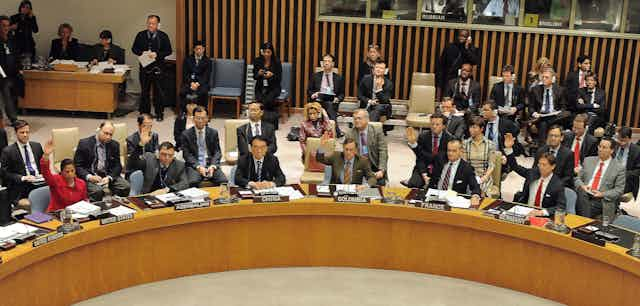It took a herculean effort, a lot of lobbying and much cash, but Australia has now, with a certain degree of surprise, netted a non-permanent seat at the UN Security Council for two years, starting in 2013.
While it can be said that Australia might have chances to be conspicuous in the organisation, the debate surrounding efforts to obtain the position, and an understanding of the security council, has been lamentably limited.
It all began late. Late that is, if you compare Australia’s attempt to gain the seat with rival contenders Luxembourg and Finland. Former prime minister and foreign minister Kevin Rudd first threw Australia’s hat in the ring in 2008 with the enthusiastic support of the Department of Trade and Foreign Affairs. He proceeded to distribute largesse and travel the world to drum up support for the bid, even as funding for Australian missions, not to mention their number, was diminishing.
Rudd was behind the competition – Luxembourg and Finland commenced their campaigns in 2001 and 2002 respectively. DFAT still felt that an earlier running should be made, rather than waiting for the 2019-2020 period.
The degree of desperation on the part of Australian officials to make their case has verged on comical. The Liberal Party’s Joshua Frydenberg was particularly scornful of Australian efforts to lobby members of the Non-Aligned Movement in Tehran in August. He said:
Our high-level delegation was present just at the time Australia is enforcing numerous financial, export and travel sanctions against the Iranian regime.
The opposition has also demonstrated astonishing ignorance of a different kind. Tony Abbott demonstrated his lack of awareness of other countries operating within the UN with his remark: “It shouldn’t be too hard to win a race against Finland and Luxembourg.”
The tune was certainly different in the Liberal Party’s pre-Abbott days, when Brendan Nelson expressed his support for Rudd’s move. In truth, Australia’s bids for such seats have tended to be more bipartisan than not.
There were certainly vocal supporters for Canberra’s bid. Jose Ramos-Horta’s piece in the Sydney Morning Herald pledging his support was almost gushing, highlighting “Australian civil society” as part of the country’s “engagement with the region and world”.
For prime minister Julia Gillard, Australia had unique claims. On a recent visit to New York to visit the United Nations, Gillard said:
Whether you look at the Pacific, whether you look at Asia, we believe Australia is placed to bring a perspective to the UN Security Council that our competitors could not
This is fanciful stuff, misunderstanding the role of a non-permanent member on the Security Council. Effect and image are simply not the same thing, and being at the same table with China and the US ignores the fundamental, in-built impediment in Security Council politics – the veto.
If a state is not a permanent member, it is actually better off having an effect outside the council, something Scandinavian countries have shown time and time again. And the Australian bid ignored Canberra’s strategic, even obsessive proximity with Washington – do we forget that, in our supposedly “democratic” impulse, we helped the United States start wars in Iraq and Afghanistan?
Another feature has come into play here – the aid program, or, to put it more accurately, the bribery platform. As Raoul Heinrichs of ANU’s Strategic and Defence Studies Centre explains, this was “a largely costly exercise in diplomatic grandstanding”.
Take Africa, the site of 53 UN votes, to which Australian aid was trebled after the bid was announced. Admittedly, some of these aid strategies were in the pipeline before the bid was announced, but the power of money is still very much in evidence.
Some have tried to justify the cost of the venture. Thom Woodroofe of the Asia Society claims the cost of $23.6 million was modest relative to other projects. (But then daft policies are always relative.) Woodroofe’s praise for the Australian bid cloys:
As a middle power globally and an important regional player, we will also bring a lot to the table in our own right, including as the 13th largest economy in the world, the 6th largest by landmass, the 3rd largest maritime zone, and as a proud contributor of more than 65,000 peacekeepers to different UN operations.
In all of this, the credentials of Luxembourg and Finland are diligently ignored. Both will go to a runoff election, having won 128 votes and 108 votes to Australia’s 140.
Having a power such as Luxembourg on the security council would actually have its advantages. The more innocuous the state in this case, the better. It is an admission that the real power resides with the permanent five who need wise counsel rather than compliant “friends”.
Australia is marginal in international politics (“middle power” should really be read as “minor, exaggerated power”), but notable enough to be seen as a yes man beholden to Washington’s bidding.
Yes, Australia won a seat on the security council, but it’s a misunderstood victory, and no great result for the UN.

